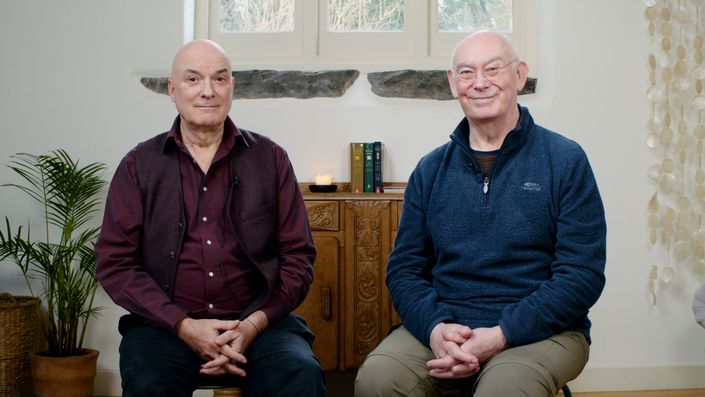Demystifying Nirvana
With Christina Feldman, John Peacock, and Jake Dartington.
A candid exploration of awakening as a possibility for each of us, in the lives we live.
Available now.

The goal can be reached
This possibility of awakening is rarely spoken about. Do we feel that nirvana (or nibbana) is inaccessible, that we're not worthy, that this is reserved for an elite few? We would like to unpack this word, nirvana. Is it merely on some distant horizon, or is it something possible for each of us?
This was the Buddha's message: that every human heart, if infused with sincerity, with dedication, with commitment, can come to the same liberating understandings that the Buddha came to.

Participate at your own pace
This easy-to-use online course is available to all. It is comprised of 6 units that form a program of instruction, discussion, meditation, and inquiry.
Each unit contains around 1 hour of material to study as well as contemplative exercises. A new unit will be released each Monday. You are free to study at your own pace and will retain access to the material.
You can follow the course on a computer, tablet, or phone, or download the course as audio files.
Sample: Ceasing to Fuel Greed, Hatred, and Delusion
John reveals how awakening is understood in the early Buddhist texts.
Features and Benefits

Expert teachers
Benefit from the wisdom of three teachers with decades of combined experience and a range of practical approaches to awakening.

Informed discussions
This topic can be difficult to approach. It helps to have a few different perspectives and see what common ground can be established.

Suitable for all practitioners
This course shares a clear-eyed view of awakening that will be helpful to both new and experienced practitioners. All Buddhist terms will be explained and made relevant to your life and practice.

Take the course with you
You don't need to be sitting at a computer to take this course. You can use a tablet or phone, or even download the audio files or a printable workbook, and head off into nature or to a café.

Essential knowledge, and confidence
Here is a pragmatic guide to understanding nirvana that aims to find a reasonable way forward. For us as seekers and practitioners, this knowledge is an invaluable boost to confidence and motivation.

Awakening in your life
There are so many teachings on offer, and our access to them has never been greater. So it can be easy to lose sight of the true heart of the path: awakening. This course aims to inspire and equip you for this realization.
A Note From the Editor
It may not be possible to understand the Buddhist path until you understand where it is heading. Demystifying Nirvana is perhaps the key that unlocks this perspective. This online course certainly reveals much about the perspectives of its teachers as Christina Feldman, John Peacock, and Jake Dartington candidly share their understanding of what awakening is, and what it isn't. This is not demystifying in the sense of making nirvana mundane but rather dispelling the misconceptions that obscure awakening.
Demystifying Nirvana is a major connecting thread between all of the Bodhi College courses to date. It reveals new linkages and a beautiful consistency between diverse Buddhist teachings. When you conceive of nirvana in this way, pieces begin to fall into place. We see how mindfulness, heart practices, and the wisdom of dependent arising all contribute to a cooling of our agitations, the opening of a space, and the wonderful qualities that arise there.
—Mark Cooper, Course Designer
Sample: Cooling the Fires
Jake presents a model of awakening that is within reach, and yet retains the depth and significance we find in the early Buddhist discourses.
How the Journey Unfolds
Sample: A Realistic Goal
Christina describes her early encounters with the possibility of nirvana.

Christina Feldman
Christina Feldman is a cofounder of Gaia House and a guiding teacher at Insight Meditation Society, Barre, Massachusetts. The author of a number of books, she has been teaching Insight Meditation retreats internationally since 1976.
She is one of the teaching faculty of the CPP program, dedicated to the study and application of the early teachings of the Buddha and is engaged in teaching the Buddhist psychological foundations of mindfulness to those training to teach mindfulness-based applications in England, Belgium, and the Netherlands. Her most recent book is Mindfulness: Ancient Wisdom Meets Modern Psychology, written with Willem Kuyken.

John Peacock
John Peacock is a retired academic and a Buddhist practitioner for over fifty years. He initially trained in the Tibetan Gelugpa tradition in India and subsequently studied Theravada in Sri Lanka. He lectured in philosophy at the University of Manchester, Buddhist Studies at the University of Bristol, and finally became codirector of the master's degree in Mindfulness-based Cognitive Therapy at the University of Oxford. John has been teaching meditation for over thirty years and continues to research and teach the similarities and differences between early Greek thought and practice, existentialism, and early Buddhism. He has a particular focus on ethics within all of these different approaches.

Jake Dartington
Jake Dartington has practiced Buddhist meditation since 1995. After training as a dharma teacher with Christina Feldman, he started teaching in 2007. He has a background in Philosophy and Buddhist Studies and has trained as a teacher of MBSR/MBCT. Jake lives in Nottingham, UK, where he teaches mindfulness and Insight Meditation.
Testimonials
Praise for Demystifying Nirvana
Can Nibbana be brought down to earth? Understandable and sensible, this course provoked thought and gave a perspective that nibbana is not a permanent 'retirement home' but a dynamic result of conditions. A worthwhile perspective of the goal and the path, and the relations between them.
Praise for Bodhi College courses
I am 65 years old and have taken many workshops and courses. This is probably the best and most useful course on Buddhism I have ever taken. Having the three teachers teach individually and interact was very beneficial. I am so glad I took this course.
One of the most enjoyable online courses I’ve taken. It’s still resonating within me.
It was wonderful to listen to the three teachers, and their knowledge was infused with skillful teaching. The subject of the five spiritual powers was inspiring and will greatly support my practice. I intend to retake the course more slowly and with greater focus now that I have it in my Tricycle course folder. Thank you, and know that you have created such a great gift of dharma knowledge. I am so appreciative.
This course on a pithy topic with teachers well-versed in the dharma and their respective fields was well worth my investment of time and money. The teachers are clear and engaging, the discussions thought-provoking, and the supplemental resources allow easily for continued study.
An excellent course! I thoroughly enjoyed it, especially the multiple perspectives offered by the different teachers. It is refreshing to see such a complex and rich topic addressed from different angles through the perspectives of experienced teachers, rather than relying on a single point of view.

About Bodhi College
The purpose of Bodhi College is to develop fresh ways of understanding the dharma today through rediscovering the core insights of early Buddhist teachings. Courses provide a contemplative education that inspires students to realize the values of the dharma (Buddhist teachings) in the context of this secular age and culture.
In the spirit of the Buddha’s teaching, Bodhi College is committed to a middle way of human awakening that integrates theory with practice, encouraging both personal fulfillment and social engagement.
Detailed Curriculum
See everything that's included in the course.
- Introduction (2:45)
- Perspectives on Awakening (13:14)
- I've Got It Now! Or Have I? (13:03)
- A Gradual Accumulation That Suddenly Changes Your Life (18:20)
- Check Your Understanding
- Meditation 3: Receiving, Allowing, Releasing (14:35)
- Reflect
- Teacher Discussion: It's What We Learn that Counts (17:41)
- Discuss
- In Daily Life (2:31)
- Summary
- Introduction (3:26)
- Entering the Stream (12:09)
- Putting Down the Burdens (11:44)
- The Four Stages of Awakening (20:59)
- Check Your Understanding
- Meditation 4: Mindfulness of Mind and the Insubstantiality of Self (13:21)
- Reflect
- Teacher Discussion: Reading the Map (15:32)
- Discuss
- In Daily Life (8:20)
- Summary
- Introduction (3:55)
- Freedom Within (16:31)
- Dependent Arising in Action (10:43)
- Untying the Knot of Dukkha (20:09)
- Check Your Understanding
- Meditation 5: Loosening the Tangle with Mindfulness of Feeling Tone (20:07)
- Reflect
- Teacher Discussion: Samsara and Nibbana Are No Different? (16:10)
- Discuss
- In Daily Life (7:19)
- Summary
Related Courses
You may also be interested in these online courses from Bodhi College and Tricycle.




